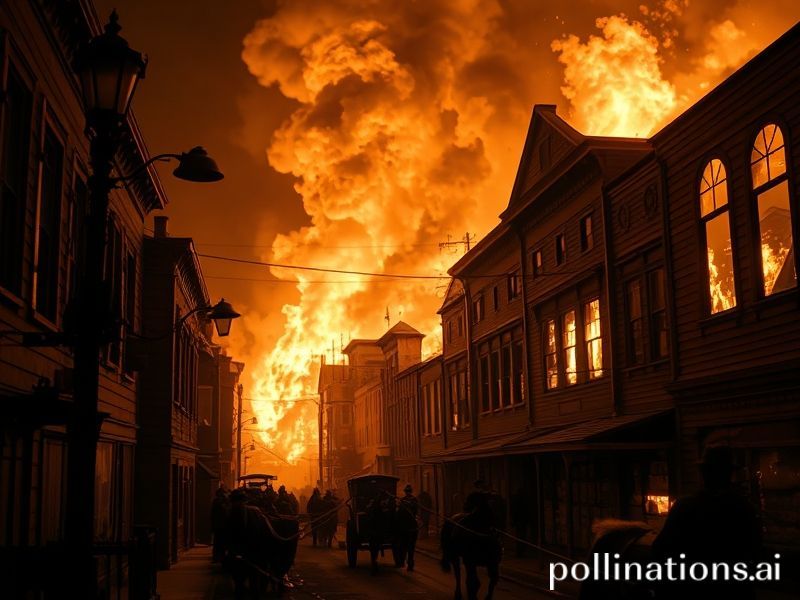Global Embers: How Chicago Fire Became the World’s Favorite Fictional Inferno
Chicago Fire, Global Alarm: How a Midwestern Script Became the World’s Favorite Disaster Comfort Blanket
Somewhere between the Baltic Sea and the Bay of Bengal, a commuter in a Seoul subway car is wiping away tears over the death of a fictional firefighter who never drew breath outside a soundstage in Illinois. The scene is so touching that three strangers silently hand over tissues—an act of solidarity normally reserved for real tragedies like currency devaluations or a battery fire in a Galaxy Note. Yet the tragedy on their phone screens is, of course, Chicago Fire, NBC’s long-running ode to sooty abs and municipal underfunding.
From an international vantage point, the show’s 12-season longevity is less a testament to American narrative genius than to humanity’s enduring appetite for controlled catastrophe. While actual climate-driven wildfires now incinerate Canada, Greece, and Australia with the casual indifference of a bored arsonist, global viewers binge on a Chicago where the flames are neatly extinguished by the 43-minute mark—complete with lingering shots of a Dalmatian that has better health insurance than 30% of the U.S. population.
In Europe, public broadcasters once thrived on gloomy domestic dramas about adulterous accordion teachers; now they import Chicago Fire dubbed into 17 languages, because nothing says “universal theme” like a collapsing grain silo and the heteronormative tension inside it. German critics call it “Feuerwehr-Noir”; Brazilians joke that the real fantasy is a firehouse that still has a pension fund. The irony is thicker than bunker gear: countries that have long mocked American disaster capitalism are now soothed by a fantasy in which municipal workers are heroes instead of underpaid strike targets.
Meanwhile, the show’s soft-power diplomacy is subtler than a Halliburton invoice. Firehouse 51’s rotating cast of troubled hunks has done more for NATO cohesion than half the summits in Brussels. A Polish teenager can quote Lieutenant Casey in the same breath as NATO Article 5, proving that shared cultural references are the new missile shield—cheaper, too. The Pentagon quietly cheers: why spend billions on hearts-and-minds campaigns when Dick Wolf can do it for the price of a fog machine and a Taylor Kinney torso?
Of course, the real Chicago is currently debating whether to close six actual fire stations to plug a pension hole you could drive an aerial ladder through. That detail rarely appears on-screen; it would clash with the product placement for Ford Explorers. Still, international audiences recognize the sleight of hand. They’ve watched their own governments turn public services into reality-TV competitions—Greece auctioned off islands, the UK privatized water—so a glossy fiction about a fully funded fire department feels like utopian sci-fi. Black Mirror could never compete.
Streaming platforms have noticed the appetite. Netflix India is reportedly developing Mumbai Blaze, a knockoff where monsoon floods meet Bollywood dance numbers, while Kenya’s Showmax counters with Nairobi Heat, proving that the Global South can also fetishize civil servants—preferably shirtless and traumatized. The genre’s secret is that it lets viewers rehearse empathy without the inconvenience of actual risk. You can sob over a scripted blaze at 9 p.m. and still vote to defund the fire brigade the next morning. Emotional cardio, zero calories.
None of which diminishes the show’s odd, accidental nobility. In an era when real first responders are more likely to be filmed as perpetrators than heroes, Chicago Fire offers a nostalgic loophole: a universe where institutions still sort of work, colleagues call each other “brother” without irony, and the worst thing that happens in a shift is a poorly timed explosion—not a union-busting mayor livestreaming it on TikTok.
So, dear reader from Reykjavík to Riyadh, when you queue up the next episode, remember you’re not just consuming American melodrama; you’re participating in a planetary ritual of controlled panic. We are all, in our own way, huddled around the same digital campfire, warming our hands over pixels that pretend to be flames, grateful that for once the only thing actually burning is our monthly subscription fee. Sleep tight; the Dalmatian’s on duty.







